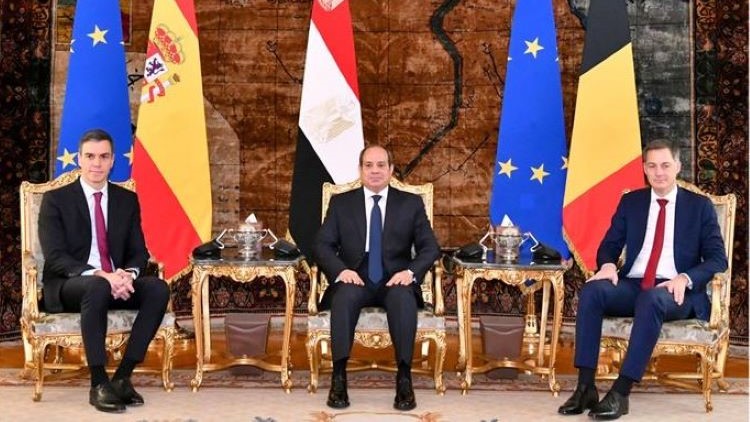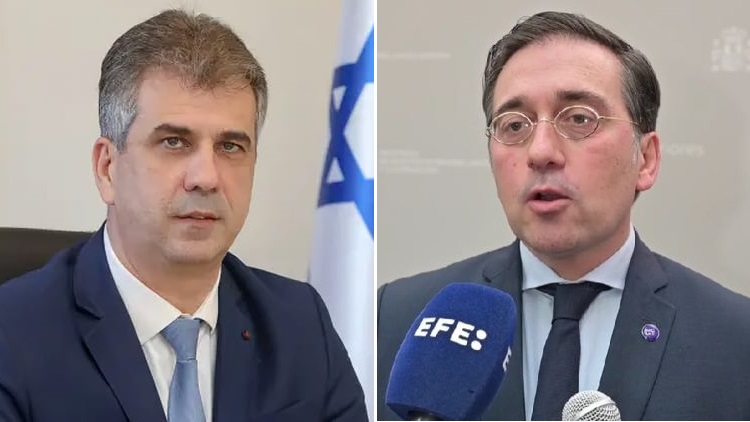Eduardo González
The President of the Government, Pedro Sánchez, announced yesterday in Egypt that Spain is going to send four tons of medical material to the Egyptian hospitals that care for Palestinians evacuated from the Gaza Strip. Likewise, he warned, at the end of his tour of the Middle East, that if the EU does not recognize the Palestinian State, “Spain will make its own decisions.”
“We celebrate the agreement for the release of the hostages and to establish a humanitarian pause in Gaza,” Sánchez declared during a statement to journalists after meeting in Cairo with the president of Egypt, Abdel Fatah al Sisi, within the framework of his tour of the Middle East accompanied by the Prime Minister of Belgium, Alexander de Croo. “I hope it lays the groundwork for a lasting humanitarian ceasefire,” he continued.
“I want to express Spain’s commitment to Egypt in the response to the current crisis,” Pedro Sánchez continued. “This week our country will deliver a shipment of medical supplies to Egyptian hospitals and thus increase their capacity to care for Gaza evacuees,” he added. Specifically, Spain will send four tons of medical equipment to help Egyptian hospitals caring for wounded and sick Palestinians evacuated from the Gaza Strip. This is “one more example of how the European Union collaborates to support our partners,” he added.
Sánchez and De Croo are in Egypt on behalf of the current and the next Presidency of the EU Council (held, respectively, by Spain and Belgium). On Thursday, the first day of the tour, the two leaders were received in Jerusalem by the president and prime minister of Israel, Isaac Herzog and Benjamin Netanyahu, and in Ramallah by the president of the Palestinian National Authority, Mahmud Abbas.
During the same statement to the press, in which he was accompanied by Al Sisi and De Croo, Sánchez warned of the need to “achieve peace” in the Middle East, and, to do so, “we must play a constructive and active role.” . “We have proposed a conference as soon as possible. I hope that Europeans, Arabs and the rest of the world can put an end to this cycle of endless violence,” he added. Likewise, Sánchez asked that the truce be maintained and that aid to Gaza arrive on a “regular and frequent” basis. “Hamas’ aggressions do not have to result in the deaths of Palestinian women and children,” he warned.
For his part, Al Sisi announced that Egypt has offered 75% of the humanitarian aid that has entered the Gaza Strip and asked the international community to contribute to this aid. He also pledged to keep the Rafah border post open for the entry of aid and the exit of hostages. “We are talking about a temporary four-day truce and we hope it is extended for the delivery of more hostages and prisoners, and also for the delivery of more aid,” he declared. Separately, De Croo asked that access steps to the Strip from Israel be also opened because “the civilian population of Gaza needs it.” “It is good that there is a temporary ceasefire, but the goal is a permanent ceasefire,” he warned.
Arab League and Rafah crossing
Next, Sánchez and De Croo met with the secretary general of the Arab League, Ahmed Aboul Gheit, at the headquarters of this organization in Cairo. During the meeting, according to the Arab League, Aboul Gheit discussed with both of them the importance of making “a real effort at the international level to achieve the two-state solution” and thanked Spain for “the important proposal” of the international conference of peace and expressed his desire for “concerted action at the Arab and European level to turn this idea into reality as soon as possible.”
Subsequently, the two European leaders moved to the vicinity of the Rafah border crossing, where they met with those responsible for the Egyptian Red Crescent and held a joint press conference in which the President of the Government assured that “Spain will continue to demand a “durable ceasefire,” because “this ceasefire is a great step, but it is not enough, a permanent humanitarian ceasefire is needed,” he declared. “We have actively and passively requested a ceasefire from Israel. “We have had a clear-sighted position on the matter, the cessation of violence, the two-state solution and the entry of aid into Gaza,” he added.
According to Sánchez, this “is the time to give the region a horizon of peace and security, stability” and to “offer the Palestinian people a horizon of hope” through the two-state solution. “We live in an international moment where the entire international community has to show its support for this lasting solution,” he added. For this reason, the head of the Executive warned that “both Israel and Palestine must be present” at the peace conference proposed by Spain, but “hostilities must first be put to an end.”
When asked if Spain could unilaterally recognize the State of Palestine, Sánchez responded: “The time has come for the international community and the EU to once and for all recognize the State of Palestine. “It is something that is worthwhile, that is important enough and that in the European Union we have to do together, but if this is not the case, Spain will make its own decisions,” he warned. During the recent investiture debate, Pedro Sánchez assured that “the new Government is going to work in Europe and in Spain to recognize the Palestinian State.”







